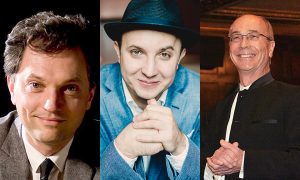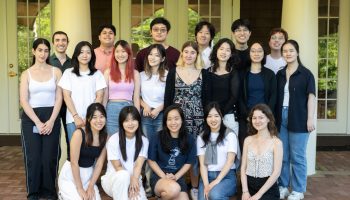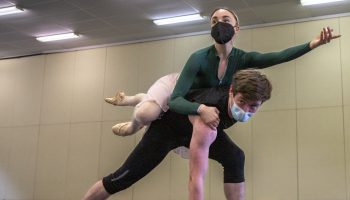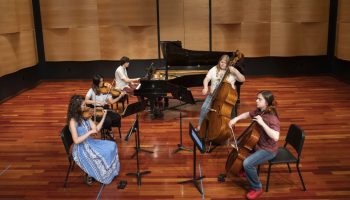
On Wednesday morning, the rain was coming down on Chautauqua Institution as three School of Music faculty members were setting up for rehearsal.
The mood might have been somber — in addition to the the weather, the trio was rehearsing Sergei Rachmaninoff’s Piano Trio No. 2 in D minor, a tragic and mournful elegy for the death of Pyotr Ilyich Tchaikovsky.
Instead, the group was having quite a bit of fun.
“So sexy!” cried out cellist Arie Lipsky, when violinist Aaron Berofsky played a melodic passage with impressive delicacy.
“I’m the wise man, and he’s the beautiful girl,” Lipsky said with a laugh, again referring to Berofsky. The group, although having never performed together before, seemed to click immediately.
At 4 p.m. on Saturday, June 30, in Elizabeth S. Lenna Hall, the three School of Music School faculty members — Berofsky, Alexander Gavrylyuk and Lipsky — will perform Dmitri Shostakovich’s Piano Trio No. 1 in C minor, op. 8 and Sergei Rachmaninoff’s Piano Trio No. 2 in D minor, Trio élégiaque, as the first in the 2018 Chautauqua Chamber Music Resident Artist Series.
The two pieces on the program share many qualities — they’re both Russian trios written by 20th-century composers, they were written when the composers were very young, and they are rarely performed. In a sense, they both represent the last vestiges of Romanticism in western classical music.
Shostakovich’s Piano Trio No. 1, written when the composer was only 17, was the last Romantic piece he would ever produce, according to Berofsky. It contains many of the dry, sarcastic elements that Shostakovich would eventually become known for, but it also has tender, expressive moments in which the violin and cello sing their melodies over delicate harmonies from the piano.
Rachmaninoff also wrote his Piano Trio No. 2 at a young age — he was just 20. Rachmaninoff would go on to write much more music in a Romantic style, but many consider him to be the last great composer to do so.
“(Rachmaninoff) took after Tchaikovsky, who was probably one of the most melodic composers of the 19th century,” Lipsky said. “Rachmaninoff lived well into the 20th century, but his musical language stayed pretty much in the 19th century.”
That Tchaikovsky-steeped language is on wonderful display in this piano trio, which starts with a heart-breaking theme that reappears in different forms throughout the work. But in Berofsky’s opinion, it’s best not to think about themes and form at the concert — he advises not to engage with the piece too analytically.
“I don’t know that (the audience needs) something to be talked about before, to hold on to. I sense that it will just kind of wash over them,” Berofsky said. “And if you’re analyzing it too much, thinking too much left brain, I have a feeling you might get impatient because it’s just so broad and singing. But if you don’t do that, then it’s very beautiful.”




